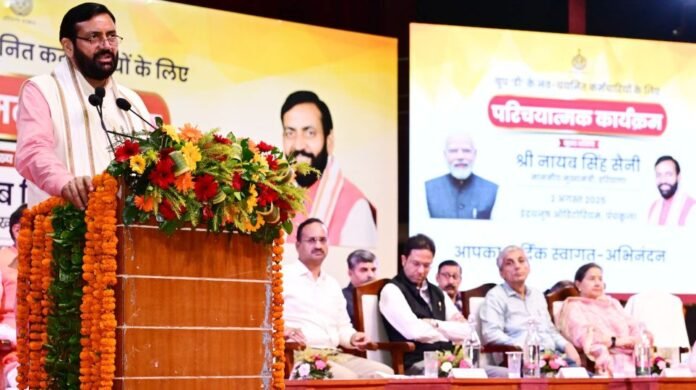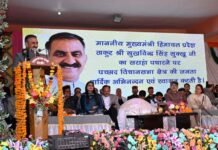Reaffirming the commitment to clean governance and efficient administration, Haryana Chief Minister Nayab Singh Saini on Saturday addressed a gathering of newly appointed Group-D employees in Panchkula. Speaking as the chief guest at the introductory programme, the Chief Minister emphasized that public service is not just a job but a sacred responsibility and a tribute to the land and society that shaped us.
He said that government employees form the vital link between citizens and governance, playing a crucial role in the progress of the state. “Whatever the department or designation may be, one principle should guide every employee — that public interest is paramount,” he remarked. Saini called upon the new recruits to work with honesty, commitment, and a deep sense of responsibility to contribute to the vision of a “strong, inclusive, and self-reliant Haryana.”
Describing Haryana as a land of growth and innovation, the Chief Minister said the state has achieved remarkable success in sectors like agriculture, education, healthcare, sports, women empowerment, and digital governance. “We are touching new heights today not just because of policy decisions but because of the untiring efforts of dedicated and sincere officers and employees. This legacy of service and integrity must continue,” he said.
Saini highlighted the transformation India has undergone in the last 11 years under Prime Minister Narendra Modi’s leadership. “In 2014, India stood at 14th in the world economy rankings. Today, we are the fourth largest economy globally, thanks to consistent reforms and robust growth,” he pointed out.
Taking a strong dig at the opposition, the Chief Minister accused previous governments of turning job allocation into a corrupt practice. “During election campaigns, opposition leaders openly offered jobs in exchange for 50 votes. Jobs were auctioned,” he said. In contrast, the present BJP government, he claimed, has ushered in a transparent recruitment process. “We have ensured merit-based recruitment. Now even children from poor families are securing government jobs on the strength of their talent and hard work,” he added.
The Chief Minister noted that the government has followed the mantra of “Jan Seva Hi Param Dharma” (Public service is the greatest duty) since 2014 and adopted a strict zero-tolerance policy toward corruption. “This policy is not just written in files, it’s visible on the ground through actions,” he stressed.
Saini shared that the government has offered 30,000 government jobs in its third term, removing interviews from Group C and D recruitment processes and making written exams mandatory to ensure fairness. Additionally, the government has helped over 1,06,283 youth secure jobs in the private sector through 2,083 employment fairs across the state.
In a major announcement, the Chief Minister confirmed that Haryana government employees will be covered under the Unified Pension Scheme (UPS) starting from August 1, 2025. A notification regarding this has already been issued on July 2, and around 2 lakh employees will benefit from the scheme, which is modeled after the Central Government’s initiative.
Lauding the efforts of various departments, including the Roadways and education departments, Saini appreciated the seamless execution of the Common Eligibility Test (CET) for Group C posts held on July 26 and 27. He said the coordinated efforts of employees, NGOs, and private schools ensured that no candidate faced inconvenience in reaching their examination centers.
The Chief Minister assured that the state will continue to invest in better training, skill development, and welfare for its employees, while also upgrading infrastructure and digitizing administrative processes to improve efficiency at every level.
This address was not just a welcome for new employees but a reinforcement of the administration’s vision: governance rooted in service, transparency, and meritocracy. It reflects Haryana’s continued trajectory toward a development-oriented, inclusive model that values both talent and accountability.
This news is sourced from the web media and derived from international news websites





